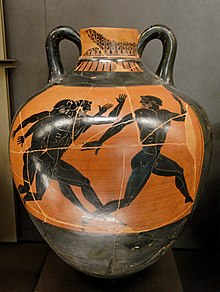Politics

This section needs additional citations for verification. (May 2010) (Learn how and when to remove this template message) |
Benito Mussolini used the 1934 FIFA World Cup, which was held in Italy, to showcase Fascist Italy. Adolf Hitler also used the 1936 Summer Olympics held in Berlin, and the 1936 Winter Olympics held in Garmisch-Partenkirchen, to promote the Nazi ideology of the superiority of the Aryan race, and inferiority of the Jews and other "undesirables". Germany used the Olympics to give off a peaceful image while secretly preparing for war.
When apartheid was the official policy in South Africa, many sports people, particularly in rugby union, adopted the conscientious approach that they should not appear in competitive sports there. Some feel this was an effective contribution to the eventual demolition of the policy of apartheid, others feel that it may have prolonged and reinforced its worst effects.
In the history of Ireland, Gaelic sports were connected with cultural nationalism. Until the mid-20th century a person could have been banned from playing Gaelic football, hurling, or other sports administered by the Gaelic Athletic Association (GAA) if she/he played or supported Association football, or other games seen to be of British origin. Until recently the GAA continued to ban the playing of football and rugby union at Gaelic venues. This ban, also known as Rule 42, is still enforced, but was modified to allow football and rugby to be played in Croke Park while Lansdowne Road was redeveloped into Aviva Stadium. Until recently, under Rule 21, the GAA also banned members of the British security forces and members of the RUC from playing Gaelic games, but the advent of the Good Friday Agreement in 1998 led to the eventual removal of the ban.
Nationalism is often evident in the pursuit of sport, or in its reporting: people compete in national teams, or commentators and audiences can adopt a partisan view. On occasion, such tensions can lead to violent confrontation among players or spectators within and beyond the sporting venue, as in the Football War. These trends are seen by many as contrary to the fundamental ethos of sport being carried on for its own sake and for the enjoyment of its participants.
Sport and politics collided in the 1972 Olympics in Munich. Masked men entered the hotel of the Israeli Olympic team and killed many of their men. This was known as the Munich massacre.
A study of US elections has shown that the result of sports events can affect the results. A study published in the Proceedings of the National Academy of Sciences showed that when the home team wins the game before the election, the incumbent candidates can increase their share of the vote by 1.5 percent. A loss had the opposite effect, and the effect is greater for higher-profile teams or unexpected wins and losses. Also, when Washington Redskins win their final game before an election, then the incumbent President is more likely to win, and if the Redskins lose, then the opposition candidate is more likely to win; this has become known as the Redskins Rule.
As a means of controlling and subduing populations
Étienne de La Boétie, in his essay Discourse on Voluntary Servitude describes athletic spectacles as means for tyrants to control their subjects by distracting them.
Do not imagine that there is any bird more easily caught by decoy, nor any fish sooner fixed on the hook by wormy bait, than are all these poor fools neatly tricked into servitude by the slightest feather passed, so to speak, before their mouths. Truly it is a marvellous thing that they let themselves be caught so quickly at the slightest tickling of their fancy. Plays, farces, spectacles, gladiators, strange beasts, medals, pictures, and other such opiates, these were for ancient peoples the bait toward slavery, the price of their liberty, the instruments of tyranny. By these practices and enticements the ancient dictators so successfully lulled their subjects under the yoke, that the stupefied peoples, fascinated by the pastimes and vain pleasures flashed before their eyes, learned subservience as naïvely, but not so creditably, as little children learn to read by looking at bright picture books.
Comments
Post a Comment